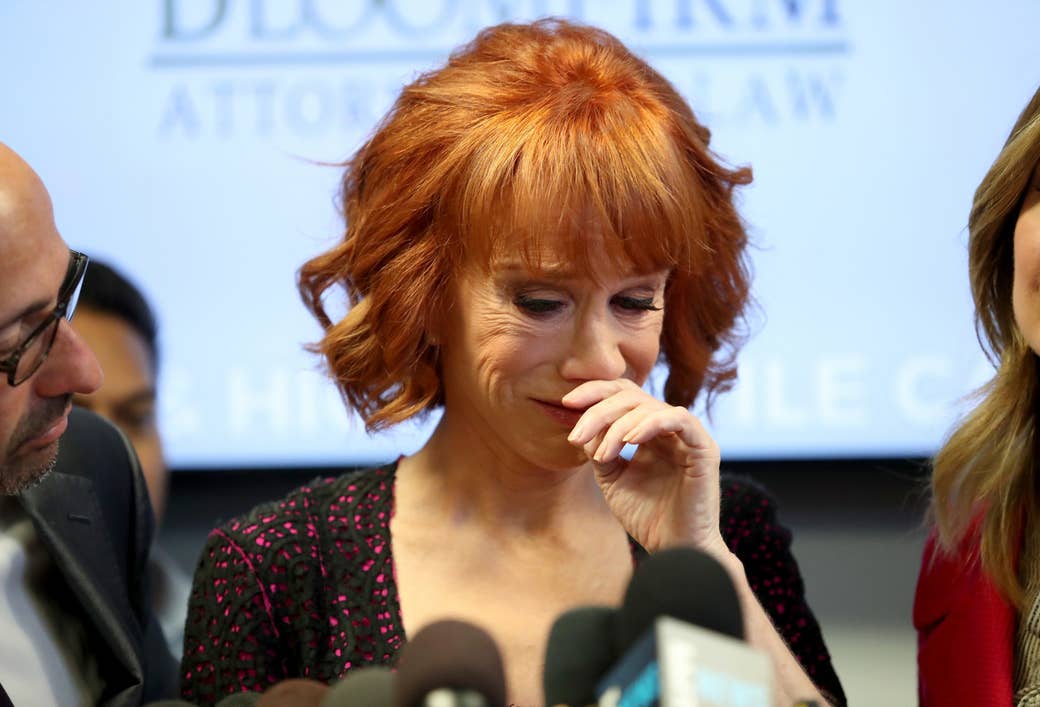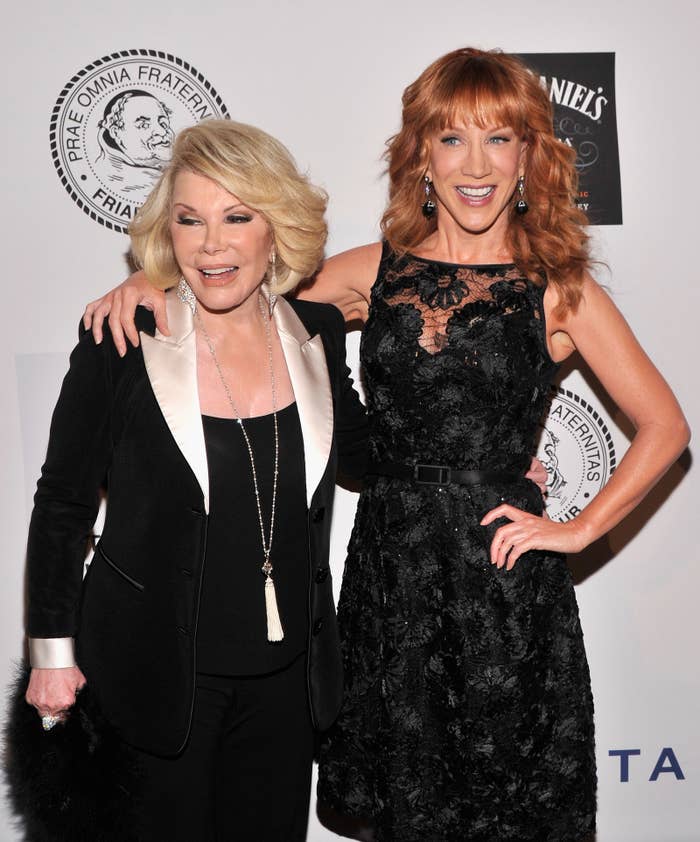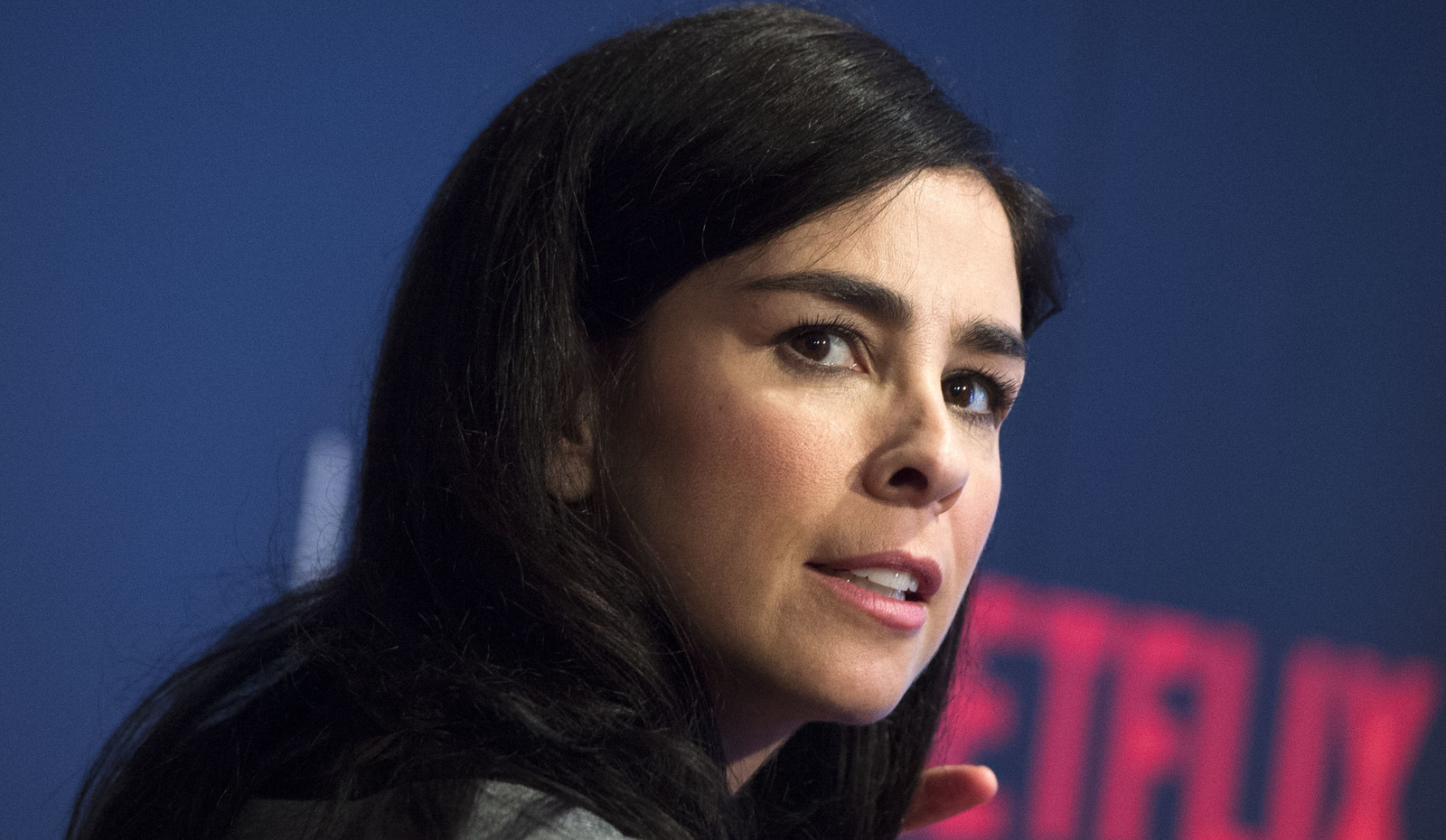
There’s a moment in Kathy Griffin’s 2005 Bravo standup special, Kathy Griffin Is...Not Nicole Kidman, where she tells a story about presenting at the American Music Awards with Ryan Seacrest. It might be one of her best worst stories: All her standup tends to circulate around celebrity gossip transformed into joke-telling, juicy tidbits about famous people that us normal people rarely get firsthand. Seacrest, apparently, was an anxious mess before they went live, worried that Griffin was going to “fuck [him]” by making him the butt of a joke. After a brief joke by Griffin about taking her top off onstage, Seacrest went off script, walked behind her, and ripped open her rented $4,000 Badgley Mischka top. She was mortified and furious; this man’s fragile ego led him to effectively assault her on live television. “You’ll have to excuse my friend Ryan,” she recounts. “That’s the first time he’s ever touched a woman.”
This is Griffin at her best: conversational and quick, telling tales about famous people you suspect are assholes and confirming that they really are. Griffin has done two HBO specials and 18 (eighteen!) comedy shows on Bravo, largely in this vein. When she’s good, she’s great. Her six-season Bravo reality show, My Life on the D-List, was perfect. The show featured stand-up prep, her relationship with her parents, her divorce, and the time Jay Leno made her cry. She was brutally honest (sometimes just brutal), funny, weird, sad, and introspective.
Griffin at her worst, conversely, is what happened earlier this week when photographer Tyler Shields released a shoot he did with her. In it, a stark-looking Griffin holds up what looks like the bloodied head of Donald Trump. It’s not even clear what the purpose of the photo was: It’s not funny, or interesting, or thoughtful. Insofar as political commentary goes, it’s about as incisive as being the first to reply to a Donald Trump tweet calling him a Cheeto.
But getting angry with Griffin over this photo is, frankly, the stuff she’s built her career on. She makes meals out of micro-controversies like this, documenting them for her standup or her reality show or her books. She talks about being banned from The View (allegedly repeatedly), not being asked back onto Ellen or Jay Leno’s Tonight Show, or being confronted by Whitney Houston after cracking jokes about her in her standup.
But the response to this particular gag has been far more costly. She lost her lucrative CNN New Year’s Eve gig, a televised event she has hosted since 2007 with Anderson Cooper, who also disavowed the photo and apparently hasn’t spoken to her since. On Tuesday, two days after the image was posted, she released an apology video, a deeply awkward, barely 30-second clip so stilted it seemed like she had never had to apologize for anything before. And then today she had a press conference with her attorney Lisa Bloom, apologizing again, but also claiming that she’s under Secret Service investigation, that she’s getting death threats and has been dropped from multiple jobs — five and counting. Bloom called the image “a parody of Trump’s own sexist remarks, taken to an extreme, absurdist visual,” and Griffin talked mostly about wanting to be a role model for other women as well as defending the First Amendment. “What’s happening to me has never happened, ever, in the history of this great country, which is that a sitting president of the United States and his grown children and the first lady are personally — I feel — trying to ruin my life forever,” she said. This is Griffin at her most sincere, because this is Griffin enduring her harshest punishment: She’s been fired before, or yelled at, or threatened, but never to this degree.

To understand how she got here, you have to consider that Griffin comes from the Joan Rivers school of comedy. Many of today’s most popular female stand-up comics do as well, to varying degrees: Amy Schumer, Sarah Silverman, and Whitney Cummings all credit Rivers as an influence on their material. But Griffin, who was friends with Rivers (and occasionally a competitor) when she was still alive, is Rivers’ direct descendent in many ways. “I would not be doing what I do if it weren’t for Joan,” Griffin wrote for the Los Angeles Times after Rivers’ death. “It was not unheard of for celebrities — the more level-headed ones, at least — to consider it something of a badge of honor to get razzes by Joan.” Both mocked famous people without care of consequence, both discussed their plastic surgeries openly, both talked about their divorce(s) and their anxieties about not being respected enough as actresses or comedians by male gatekeepers.
Sometimes this was admirable work, like when Rivers cracked jokes about the impossible beauty standards for women, routines that now seem cliched but only because Rivers got there first. On The Ed Sullivan Show in 1967, she did a set about how women need to be married before 30 and men can be single forever. “A girl, you’re 30 years old, you’re not married: You’re an old maid. A man, he’s 90 years old, he’s not married: He’s a catch.” As a woman coming up in the ’60s and ’70s New York comedy scene, Rivers was often subject to brutal sexism from the men around her for daring to have her own career ambitions. (Johnny Carson, who had Rivers on his show as a guest host multiple times, never spoke to her again after she got her own late-night show on Fox in 1986, as if she was supposed to sit around and wait for him to die in order to take over The Tonight Show.)
Kathy Griffin comes from the Joan Rivers school of comedy.
But near the end of her career and life, Rivers faced backlash from a different audience entirely. Her jokes about Lena Dunham’s weight (“You are sending a message out saying, ‘It’s okay. Stay fat. Get diabetes. Everybody die. Lose your fingers’”), or about how it was her “turn” to slap Rihanna, or even her Fashion Police segments where she tore women apart for their clothing or bodies, triggered a backlash. (She once said that North West needed waxing at six months old). Nothing about Rivers’ work — not its tone, punchlines, themes, or presentation — had shifted since she started appearing as a guest on The Tonight Show in the mid-’60s. The New Yorker’s Emily Nussbaum puts it this way: “Rivers herself had fought hard for the token slot allotted to a female comic, yet she seemed thrown by a world in which that might no longer be necessary,” Nussbaum wrote. “Her flamboyant self-hatred made possible this generation’s flamboyant self-love.” But Rivers was left in the dark; her work was considered revolutionary 30 years ago, when there was more allowance for racism or sexism, but at the end of her life, it was seen as cliched and offensive.
Kathy Griffin runs the same risks as Rivers. Her erstwhile reality show is still great, and her Seinfeld and Suddenly Susan appearances in the ’90s are still appropriately unhinged and annoying, but her current comedy is hackneyed and often offensive. In her specials, she refers to “Normal Oprah and Ghetto Oprah.” She uses the word “retarded.” She calls her queer fanbase “my gays.” One of her Bravo specials is called Strong Black Woman.
Much of Griffin’s comedic act has aged poorly because her perspective doesn’t jibe with a society slowly but surely becoming more amenable to the concerns of the marginalized. Laughing at women for being fat or at drug addicts for struggling or mocking black women by wagging your index finger and bobbing your head comes from a point of view that is dated and, frankly, uninteresting. The Trump photo shoot in particular was little more than an attempt to drum up controversy: It wasn’t funny, it wasn’t exactly thoughtful, and even Griffin’s attempt to explain the photo as commentary comes off as a poorly conceived justification. On top of Griffin’s insult comedy, she’s also known for starting fires to get herself publicity and this was one of them, though the result maybe isn’t what she was hoping for.
Admittedly, white female comics have to deal with criticism about their tone deafness more than men — blue-collar comic Joe Rogan's latest special Triggered was unwatchable — but that's maybe because they're inevitably held to a higher standard because they’ve also been subject to marginalization. All said, Tyler Shields, who took the Trump photo, isn't apologizing and hasn’t experienced a fraction of the backlash despite the shoot being his concept. It’s unavoidable (and depressing) that women will always have to bear the burden of responsibility, always required to be first to apologize. But it’s also not like comedians can’t change.

Take, for example, Sarah Silverman, another female gross-out comedian both friends with and influenced by Rivers: beautiful but brash, Jewish, upbeat but morose, with a penchant for using the n-word in her early stand-up specials. But since her 2005 special Jesus Is Magic, in which she sang a faux love song that included the lines “I love you more than black people don’t tip / I love you more than Puerto Ricans need baths,” there's been a clear shift in her work. She's done more acting, getting critical acclaim for her performances in the indie films Take This Waltz and I Smile Back. Her latest stand-up special, A Speck of Dust, came out on Netflix this week, and it’s much more personal than her other specials, with stories about her family, a near-death experience, and the loss of her dog. She’s still grossly funny: A joke she slowly builds that seems to be about her sister’s possible rape ends up being about how she got so drunk and barfed so hard that she started literally shitting her pants off. Now her targets are more deserving, or at least she’s less interested in being purposefully offensive.
In interviews, too, Silverman projects a more introspective version of herself. In a 2015 interview with Vanity Fair, she explained why she wasn’t going to call things “gay” anymore as a pejorative. She’s talked about the importance of updating your set with your audience. “There’s so much in my first special that makes me cringe, but I’m not ashamed of it,” she told Fast Company’s Joe Berkowitz earlier this week. “If you don’t look back at your old shit and cringe, you’re not growing.” She talked about how she used to think her good intentions let her say whatever she wanted onstage, as if it served a higher purpose. “Talk about a liberal bubble,” she said.
Silverman is shifting because she has to, because maturing your comedy act is a part of the trade and because audiences can tell when you’re being lazy. Even Amy Schumer has had to retire the more openly racist bits of her stand-up act — “I played a dumb white girl onstage. I still do sometimes. Once I realized I had more eyes and ears on me and had an influence, I stopped telling jokes like that onstage” — though her latest movie Snatched is another story. Comedy is shifting because its consumers are forcing it to. Joan Rivers never really learned that lesson; as she got older, she doubled down on her more shameful material. It kept her relevant on some level — she worked until the bitter end and is still a pillar of comedy history.
But Griffin is 56 years old with many years (presumably) of gigs ahead of her. The degree of her backlash is indeed unprecedented and disproportionate — Ted Nugent has threatened Barack Obama multiple times but was still invited to the White House — and certainly angrier because it’s a woman going after a president with a history of blatant sexism himself. But it’s still a different time and a different audience, and maybe Griffin is starting to grasp that: In her press conference, she spoke with an artificial wokeness, introduced by Bloom as “a bold advocate for women, the LGBT community, people of color, and veterans.” Griffin talked about being a role model for other women, how she’s done 23 comedy specials (more than any man or woman) merely so that she could say she had that record. She talked about the old white men who sign her checks, how she refuses to be silenced by men as a female and a humorist. At the very least, she seems aware that you can’t keep your feminist comedy badge while also deploying offensive material of your own against other groups, and if you want to keep working, you have to be willing to grow. For Griffin, it might be the only way her career survives.
